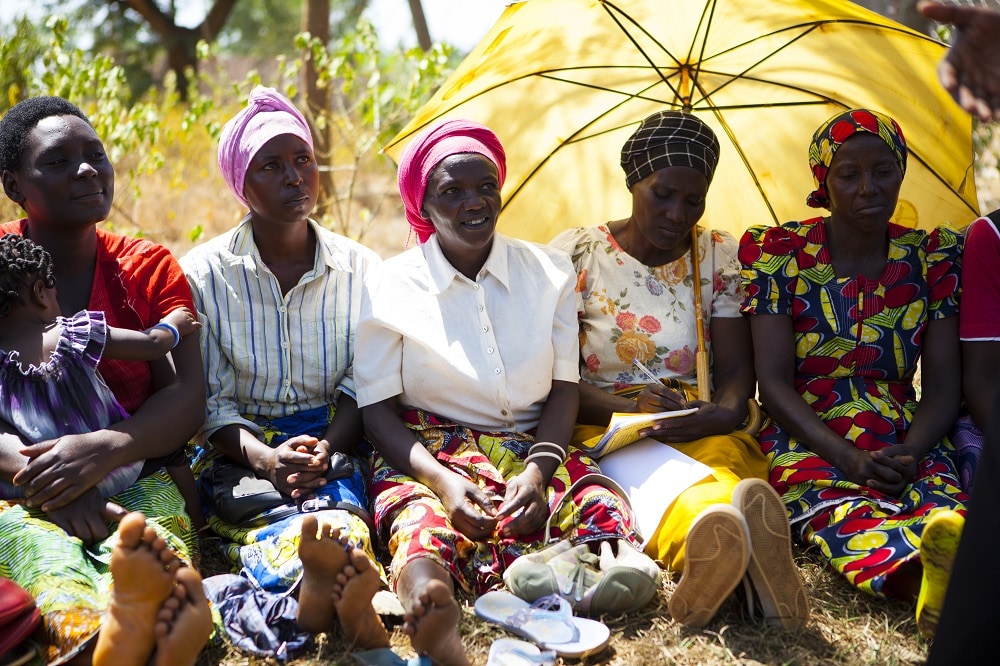Apr 30, 2018 | by Paul Rippey and Naveed Somani

In this blog, Paul Rippey of Savings Revolution and Naveed Somani, MREL Manager of the Savings at the Frontier (SatF) programme (a partnership between Mastercard Foundation and Oxford Policy Management) outline the main findings of the study.
The study was conducted in 2017 by Development Pioneer Consultants (DPC) and Paul Rippey and sought to glean insights on the preferences and usage of financial services by savings groups. The full study is available here.
There are many theories as to why informal Savings Groups fail to form relationships with financial service providers (FSPs). For many people, one of the main reasons is that FSPs have a reputation of being unfriendly, expensive and hard to work with, and there are too few facilitating NGOs to help broker relationships with FSPs. However, a recent study conducted in Tanzania suggests that these concerns may be overstated, and of equal or more importance is the need to demystify and publicise the FSPs’ processes and the products available to informal groups.
The study first looked at the kind of groups the randomly selected research respondents were part of. It found that 73 per cent of members interviewed were in accumulating savings and credit associations (ASCAs), which are groups that allow savings to accumulate from meeting to meeting. The remainder were members of rotating savings and credit associations (ROSCAs), rotating groups in which all their members bring the same sum to every meeting, which is then given to a different member at the end of every meeting. 70 per cent of the ASCAs were distributing – periodically returning all their collected savings and other funds to the members. These are the groups that are often called “Savings Groups,” and they were by far the largest component of the study population.
Perhaps surprisingly, 40% of the ASCA members interviewed said their groups already had a bank account. Local and international NGOs that facilitate the creation and training of groups have actively worked to get their groups to open accounts, and the percentage of “facilitated” groups with bank accounts was almost twice as high as the percentage of non-facilitated groups with accounts. Nonetheless, over a third of non-facilitated groups had accounts, showing that while facilitation correlates with a higher percentage of being banked, it is not essential.
At the time of the study, about a quarter of the groups were being supported by an NGO or Apex organisation, yet 73 per cent of the ASCAs in the survey considered themselves “unfacilitated.” This category includes both groups that formed spontaneously without a formal trainer and groups that had once been facilitated but have since lost contact with the trainer and their mother organisation. In fact, both the groups and many of the trainers themselves had lost contact with the NGO that they originally worked for or that had trained them.
Most group members interviewed were satisfied with the safety of their funds, either because they already had an account, because they trusted the other members of their group or because they had so little money that they didn’t worry. But, among the unbanked groups, many said they intended to open an account eventually when conditions warranted it, either for security, to obtain a grant or loan from the government (for which having an account is a pre-condition) or, in a few cases, in hopes of getting a bank loan. So far, however, none of the groups in the sample had ever received a bank loan.
While there were some complaints in the focus group discussions about the distance to branches or the high fees at banks in the individual interviews few people had anything bad to say about FSPs. In fact, the reasons members gave for not having group bank accounts were overwhelmingly that the group didn’t think they had enough money to make it worth doing, or they thought the group was too small or too young. Many of the groups interviewed had “opening an account” on the list of things they intended to do but simply hadn’t got around to it.
These findings led the researchers to conclude that the challenge for FSPs may not be to convince groups of the desirability of a bank account, but rather to show the groups how easy it is to open one and use one. It also seems quite clear that while NGOs can play a role in introducing FSPs to the groups they have formed, any FSP that relies solely on NGOs to introduce itself to Savings Groups will only reach a small percentage of the market. In fact, the study confirmed that a basic strategy FSPs should consider is to make group-friendly products while using media to market them vigorously.
Paul Rippey is an independent consultant and editor of two websites related to member managed self-capitalised financial groups: savings-revolution.org, and StartYourSavingsGroup.com.
Naveed Somani is the Monitoring, Research, Evaluation and Learning (MREL) Manager on the Savings at the Frontier Programme. Savings at the Frontier is a $17.6 million partnership between Oxford Policy Management and Mastercard Foundation. For more information, please visit http://www.opml.co.uk/projects/savings-frontier
Categories: Microfinance Financial Inclusion Sub-Saharan Africa Financial Security Savings Groups English Savings Groups Blog Blog WebinarsBlogs

1621 North Kent Street, Ste 900,
Arlington, VA, 22209
P 202.534.1400
F 703.276.1433
Website Photos: © mari matsuri
